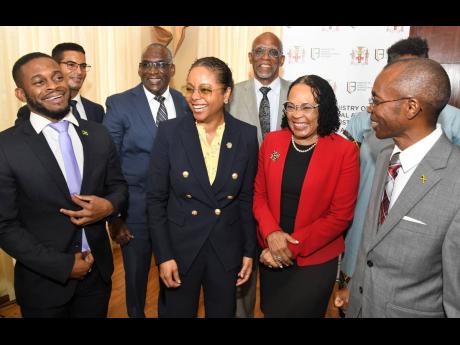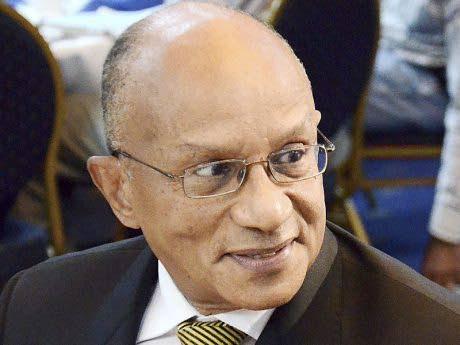Trevor Munroe | Strengthen public awareness, citizen assertiveness on Constitutional reform
Late Thursday (May 4) night, National Integrity Action (NIA) received a letter by email from the Permanent Secretary of the Ministry of Legal and Constitutional Affairs, dated May 4. The letter read in part, “re consultation on constitutional reform…. We want to hear from the NIA on matters which touch and concern the constitution… You are cordially invited to make a 15-minute presentation to the members of the CRC on Wednesday May 10, 2023 at 10.30 a.m.” On checking with our colleagues, it turned out that the Advocates Network and Jamaicans for Justice received an identical letter at the same time.
On reflection, I recalled Jamaica’s Consultation Code of Practice for the Public Sector (2005) with preface by then Prime Minister P.J. Patterson. It states “consultation is defined as an exchange of information and ideas between affected and interested people and decision makers BEFORE A DECISION HAS BEEN REACHED” (Page 2). So I then ask myself: have consensus decisions not already been taken by the Constitutional Reform Committee (CRC)? In case I was mistaken, I revisited the Jamaica Information Service release of April 17. This release headed “Constitutional Reform Decisions Based on Consensus – Malahoo Forte” reads in part, “the Constitutional Reform Committee has arrived at consensus for recommending the abolition of the constitutional monarchy … to be replaced by a formal head of state for the Republic of Jamaica”. The release went on to state, the consensus is that the selection of the president “will be on the nomination of the prime minister, after consultation with the leader of the Opposition, to be confirmed by Parliament … the two Houses sitting together to make this determination on a special vote”.
CONSENSUS DECISION
So, I ask myself, is it a consensus decision, or is it not, that the president is to be ceremonial rather than executive – to be elected by the Parliament in the manner described? If this is so, has the horse gone through the gate in relation to the president of the new republic of Jamaica, or alternatively, is the decision taken not to be treated as final, and hence still open to modification by representations from NIA, other civil society groups and from the public? If we are being invited to consult after final decisions have been made, this is an unacceptable repetition of the cosmetic consultation with the public by the Constitution-making Committee of 1961-62. Then, representations were taken from the public, after decisions had been made by the committee, and hence no decision was changed arising from public input.
Then, there is the issue of the timetable for the constitution reform process. The minister is reported to have declared on April 18, “I want to table my bill [in parliament] next month…” at an Observer Monday Exchange. Is this, and other aspects of the timetable, already decided by the CRC? Therefore, are invitations to consult on the timetable in effect cosmetic? Were this the case, the 2023 Constitution Reform Committee would be ignoring pleas for clearer and more flexible timelines in much the same way as the 1961-62 Constitution-making Committee did. At that time, representations ignored, for example, from the Law Society, warned that “better a little more time be taken in drafting a constitution than that it should be ready by February or March or April or May… It is a highly dangerous way of proceeding” (page 143, Trevor Munroe, The Politics of Constitutional Decolonisation, Jamaica 1944-1962). Needless to say, a main consequence of that “highly dangerous way of proceeding” is the Constitution which we still have 61 years later. Decided in its substance by a 15-member committee establishing a system of government whose fundamentals can only be changed by referendum. These fundamentals remain Constitutional Monarchy, Prime Ministerial and Executive dominance, with limitations on popular empowerment.
REPEAT OF 1962
Fortunately, my concern that we were seeing a repeat of 1962 was somewhat allayed when I watched on YouTube the three-hour JIS TV recording of the Ministry of Legal and Constitutional Affairs consultation with the Jamaica Umbrella Group of Churches. This took place on Thursday, May 4. During this forum, church leaders present – as well as online participants – asked probing questions and made comments critical of the manner in which the Constitution Reform Committee had hitherto proceeded. There were noteworthy responses from members of the CRC, pointing to a more inclusive approach to constitutional reform. Amongst these responses were:
• The “consensus previously announced” was “not final”, were “recommendations”, and constituted in effect “initial thoughts”. Hence, subject to further consultation. Among such matters would be the powers of the president and the method of selection.
• The minutes of the eight committee meetings held thus far would be published as soon as finalised. No definitive response was, however, given to the specific request from an online participant that the “CRC’s meetings should be live-streamed”.
• The tight timelines previously announced were regarded by many committee members as “unrealistic”, and “ambitious”. These are now being revised. Nevertheless, there should be a cut-off point to complete the process. One church leader in attendance recommended three years.
• Relatedly, each of the three phases – defined in the process – should be given a definite duration.
• The CRC was in the process of requesting and receiving a budget.
• A schedule of public consultations, including diverse methods of communication and the use of multimedia forms, was being developed though not yet published.
• Public education was considered vital; no mention was made, however, of timelines for developing and disseminating educational material in formats and language easily accessible to the man in the street. For example, similar to Dr Lloyd Barnett’s booklet developed for, and disseminated by, the 1991 constitutional reform process. In that context, material is obviously urgently required on the current powers of the governor general, the difference between a ceremonial and executive president, and different types of executive president and different modes of selection, among other issues.
• The process of constitutional reform is obliged to conform to the requirements in the constitution for amending the document. Hence, the changes that need to be considered, decided and implemented have to be in compliance with the existing amendment provisions.
I came away from watching this consultation with a sense that the committee is becoming more responsive to the imperative for greater transparency, participation, public education and public consultation. For that reason, and at the same time these signs of responsiveness should encourage civil society organisations, trade unions, the private sector, youth organisations, professional associations, farmers organisations, etc., to become more assertive in ensuring that both the process and outcome of reform is a more democratic Jamaica, where the authorities are more accountable to the people.
In that context, I want to commend the Jamaica Council of Churches for initiating a series of public conversations on constitutional reform, in the first of which – held at the Bethel Baptist Church – I was privileged to participate and contribute to what became The Bethel Accord. We continue to learn that public awareness building and citizen assertiveness matters and hence, needs to be strengthened.
Professor Emeritus Trevor Munroe is director of National Integrity Action. Send feedback to info@niajamaica.org or columns@gleanerjm.com.


